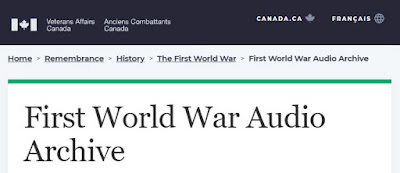Recordings
of parents, grandparents and others born a long time ago are invaluable in
learning about family history and history in general. While not always entirely
accurate due to fading memories, they allow, firstly, preservation of the
voices of those now gone from our lives and, secondly, glimpses into actual
events by people who were there.
I
will be giving talks at the Family Tree Live event in April. In addition
to activities and presentations about family history, the event will also
celebrate the 75th anniversary of VE Day, which tool place on 8 May
1945. Many of the speakers and exhibitors will focus on the military.
In
this post, though, I want to deal with sources that I came across several years
ago, but for whatever reason have never used in a blog post.
There
are a few websites on which you can hear individuals speak about their
experiences during the major wars of the 20th century, as well as
other military activities. These are actual recordings of soldiers or their
family members talking about actual events. Most have transcripts available
with the recordings.
One
site is called The Memory Project, which “houses
more than 2,800 testimonials and over 10,000 images from veterans of the First
World War, Second World War, the Korean War and peacekeeping missions. While
the archive no longer accepts submissions, it remains the largest of its kind
in Canada.” The group also provides speakers for schools and communities.
Information and recordings are available in both English and French.
Veterans
Affairs Canada
hosts a First World War
Audio Archive
where, again, you can “[l]isten to Veterans as they recall their life and
times during the war years.” The site also has a substantial amount of
information about other aspects of the war and Canadians’ involvement. The Veterans
Affairs site itself is the place to go to learn about all of Canada’s
military activities, in English and in French.
For
the United States, “[t]he Veterans History Project of the American
Folklife Center collects, preserves, and makes accessible the personal accounts
of American war veterans so that future generations may hear directly from
veterans and better understand the realities of war.”
The
US Library of Congress has a department, Recorded Sound Research Center,
where audio and visual material is stored and accessible by the public. One
such library is the Marine Corps
Combat Recordings.
The Imperial
War Museum, in the United Kingdom, has a Sound Archive which “holds
over 33,000 recordings relating to conflict since 1914. This consists of the
largest oral history collection of its type in the world, with contributions
from both service personnel and non-combatants as well as significant holdings
of speeches, sound effects, broadcasts, poetry and music.”
Family
historians may find any or all these sites of interest. Members of their own
family might even be featured. In addition to the audio recordings, they also
contain substantial information about past war records.




